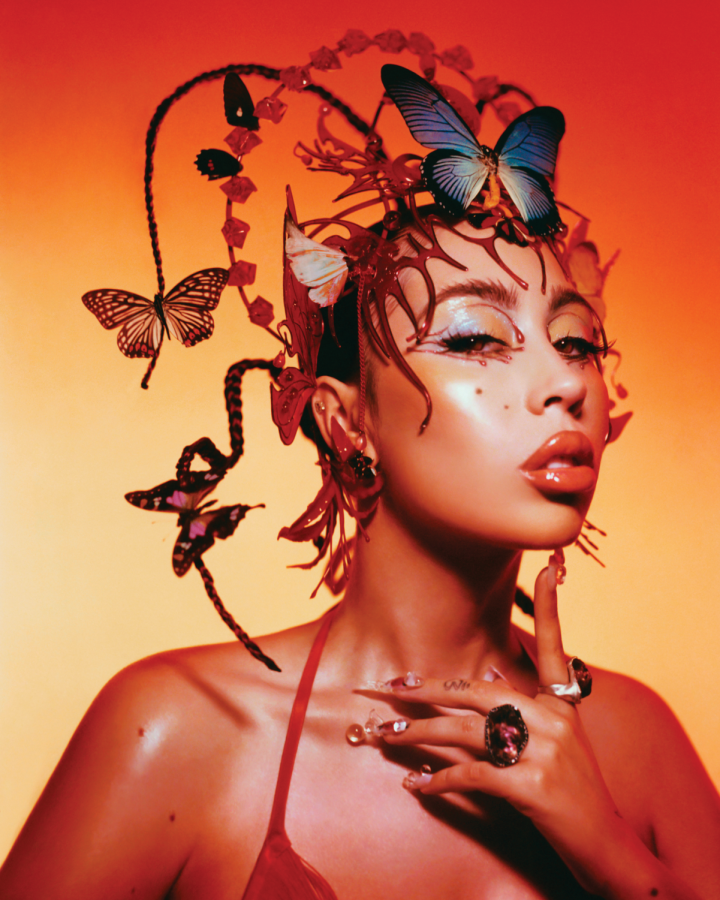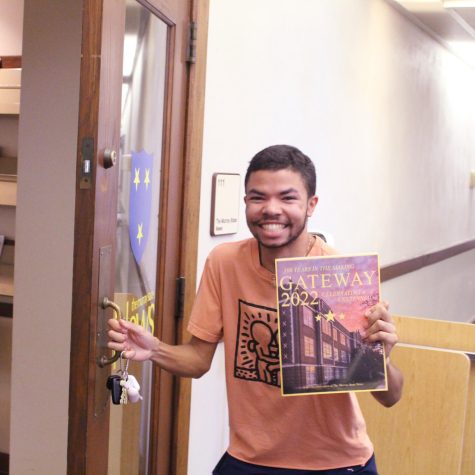‘Red Moon in Venus’ descends into love’s cosmicality
‘Red Moon in Venus’ released on Friday, March 3 under Geffen Records (Album cover courtesy of kaliuchis.com).
March 9, 2023
Basking in an ocean of passion and longing, Kali Uchis dives into the endlessness and ephemerality of love on her third album, “Red Moon in Venus.”
Uchis constructs an intersection between the ominous and dark symbol of a red moon and the planet of love, Venus, by telling a story about a love that is still burning in Uchis’ heart but is no longer a part of her life.
Karly-Marina Loaiza, professionally known as Kali Uchis, jumped into the music scene in 2012 with her mixtape “Drunken Babble,” which she made on the application GarageBand.
Loaiza continued her rise to popularity with her debut EP “Por Vida” in 2015, which cemented her voice in the music industry. It was also the beginning to some of her collaborations, such as with Tyler the Creator and KAYTRANADA, who did production work on the EP, and Loaiza went on to later make songs with.
Lyrics about love have always been on the tip of Loaiza’s tongue and often have a vindictive and confident tone. Gushing with her signature easy-flowing R&B and Neo-soul sound, Loaiza sings about love through the lens of a cosmic essence.
The 15-track-long album starts with “in My Garden…,” a 25-second introduction with Loaiza’s voice like a foggy voicemail confessing her love. Backed by chimes and the hum of summertime insects that come alive at night, the song has a soft, outdoorsy touch to it.
“in My Garden…” blends right into “I Wish you Roses,” Loaiza’s lead single. Despite her lover drifting away, Loaiza isn’t bitter; she wants him to keep whatever love she gives.
Yet, Loaiza knows he won’t always be able to feel her love, so she wishes him roses for as long as he can smell them.
“I Wish you Roses” is tender and shows love as an everflowing stream. The song does not stray from Loaiza’s classic sound of layered vocals and relaxed synths with heartfelt focus.
“Worth the Wait” introduces Loaiza’s first feature on “Red Moon in Venus”: Mexican American R&B artist Omar Apollo. Loaiza and Omar Apollo have a public friendship and both infuse their culture with their R&B sounds, so I was excited to hear them collaborate. But Omar Apollo got the same treatment Lana Del Rey got on Taylor Swift’s “Snow on the Beach.”
Omar Apollo’s vocals are present but in the background, overshadowed by Loaiza, and I wish he was stronger and more present in the song. Despite that little pinch of disappointment, “Worth the Wait,” is a solid song about a love they are willing to wait for.
However, the song is only around 2 ½ minutes long, so they could’ve given Apollo a grander appearance in that unused time.
Loaiza dives into her selfish side on “All Mine,” wishing her lover didn’t even have a phone in order to hold all of his attention. Despite not being able to fully hold his attention, Loaiza is confident her lover won’t leave her for anyone else, and the other women trying to hold his gaze can’t compete.
American rapper Don Toliver opens “Fantasy” with a slow piano introduction that breaks into an Afrobeat rhythm. It’s great to see Toliver make an appearance on Loaiza’s album because the pair are romantic partners.
“Fantasy” flows at a faster pace than the other tracks. Loaiza sings about having a lover devoted to her, which would fulfill her fantasy.
The song ends abruptly when the music halts, and Loaiza says, “That’s it. That’s the end of the song. Come on, baby, let’s go home,” and listeners can hear her heels clacking away.
“Hasta Cuando,” a Spanish-dominant track, which translates to “until when,” is largely beat driven. Instead of singing as her passionate lover persona, Loaiza finds her vindictive tone in the bridge with the lyric, “Whatever makes you feel better. Paint me as the villain if that makes you feel better.”
Loaiza sounds so calm and confident. She knows despite being occupied with other women and saying negative things about her, her former lover still subconsciously thirsts after her.
“Moonlight” has a laid-back funk twang to it. Loaiza illustrates a picture of her and her lover finding each other after a stressful day, taking advantage of the night time to unwind and get high together.
“Happy Now” ends the album. After a culmination of passionate confessions and bitter retorts, Loaiza asks herself and her lover if they can be happy now.
The song starts with a ‘70s pop groove, and Loaiza sings about the stars conspiring against her and her lover’s compatibility. Despite their chemistry, the relationship has not been smooth sailing.
The tail end of the song slows down, and Loaiza sings about focusing on those good moments, referring to them as “rainbows.”
Loaiza’s sultry voice and aesthetic pulls listeners into this world where love feels absolute and cosmically written. “Red Moon in Venus” maintains a calm, soothing tone throughout its duration, although Loaiza sings about topics that could send someone into a rage.
With love as a motif, I wish Loaiza exhibited more varied moods surrounding it. I wish she gave listeners more of the bitterness she displayed on “Hasta Cuando” because it made for such a memorable lyric moment.
A majority of Loaiza’s projects have a calmer sound, so I’d love to hear her explore a broader range of emotive expressions.
“Red Moon in Venus” is a great third album for Loaiza and deserves a seven out of 10.
Loaiza is like no other artist, and I hope she continues to expand and experiment with her sound.





























































































